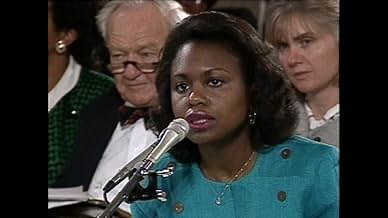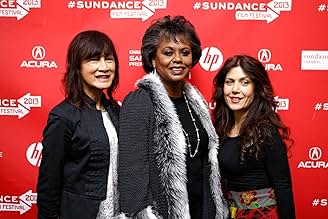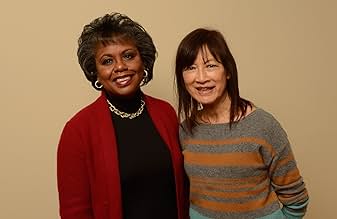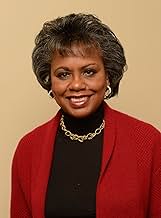Füge eine Handlung in deiner Sprache hinzuA profile of Anita Hill, the African-American lawyer who challenged Clarence Thomas' nomination to the US Supreme Court and thus exposed the problem of sexual harassment to the world.A profile of Anita Hill, the African-American lawyer who challenged Clarence Thomas' nomination to the US Supreme Court and thus exposed the problem of sexual harassment to the world.A profile of Anita Hill, the African-American lawyer who challenged Clarence Thomas' nomination to the US Supreme Court and thus exposed the problem of sexual harassment to the world.
- Auszeichnungen
- 3 Gewinne & 3 Nominierungen insgesamt
Orrin Hatch
- Self
- (Archivfilmmaterial)
Ted Kennedy
- Self
- (Archivfilmmaterial)
Patrick Leahy
- Self
- (Archivfilmmaterial)
Alan Simpson
- Self
- (Archivfilmmaterial)
Arlen Specter
- Self
- (Archivfilmmaterial)
Strom Thurmond
- Self
- (Archivfilmmaterial)
Empfohlene Bewertungen
Anita Hill shares her story about the sexual harassment she suffered from her former boss Clarence Thomas to the US Senators in this documentary. Throughout the whole proceedings, it appeared that the senators had been intimidating Mrs. Hill to repeatedly recount the disgusting details in an effort to humiliate and demoralize her, but she remained calm, patient, and determined to express her point. Her claims was not taken seriously, yet even so, I was delighted to know she had a positive influence on others. She might not have believed that voicing the truth would benefit her much, but in reality, it impacted a lot of others who were or are hesitant to speak out against their boss for fear of losing their jobs, having their reputations tarnished or receiving threats.
This is a 95-minute documentary directed by Freida Lee Mock. It tells the story of Anita Hill's testimony at the Clarence Thomas confirmation hearings in 1991 and the impact of those hearings on Anita Hill in subsequent years. She had testified for multiple days about the sexual harassment she experienced from Thomas while he was her boss.
The film includes much archival footage from the hearings and elsewhere and commentary by journalists Jill Abramson and Jane Mayer, attorney John Carr, and Harvard law professor Charles Ogletree.
In one sense, this was an embarrassing film to view, watching an all-male Senate committee attacking Anita Hill's credibility and quietly listening to Clarence Thomas forcefully state that he was being lynched (by a black woman no less). The committee declined to hear witnesses that would have corroborated Hill's testimony and the fact that she had complained about Thomas's behavior at the time it happened.
Obviously, the documentary is from Anita Hill's perspective, but one cannot watch it without believing she was telling the truth.
The film includes much archival footage from the hearings and elsewhere and commentary by journalists Jill Abramson and Jane Mayer, attorney John Carr, and Harvard law professor Charles Ogletree.
In one sense, this was an embarrassing film to view, watching an all-male Senate committee attacking Anita Hill's credibility and quietly listening to Clarence Thomas forcefully state that he was being lynched (by a black woman no less). The committee declined to hear witnesses that would have corroborated Hill's testimony and the fact that she had complained about Thomas's behavior at the time it happened.
Obviously, the documentary is from Anita Hill's perspective, but one cannot watch it without believing she was telling the truth.
Associate Justice of the United States Supreme Court Thurgood Marshall announced his retirement on June 27, 1991. President George Bush nominated Clarence Thomas to fill the vacant seat. Senator Joseph Biden chaired the Senate committee to offer a report to recommend the Senate to consent or not. The process moved smoothly, until someone leaked a letter from Anita Hill. Ms. Hill was a professor at the University of Oklahoma College of Law,where she taught commercial law and contracts. Earlier she had worked at the U. S. Equal Opportunity Commission. There, her boss, Clarence Thomas, she said, sexually harassed her. Biden's committee took her testimony, then shut down without considering other witnesses.
Freida Lee Mock's documentary about Ms Hill starts with that point of history, commencing with a "just the facts" attitude, and gradually comes to Ms. Hill's side. That takes the audience about 45 minutes into the movie. After that, we get a sympathetic half hour of Ms. Hill's roots, the impact of her testimony on her, and her life over the next twenty years.
Today, Clarence Thomas is still an Associate Justice of the Supreme Court. He is still beset by scandal. Joseph Biden is President of the United States. The first subheading on the EEOC website leads to instructions on how to file a charge of discrimination. Ms. Hill teaches at Brandeis University.
Freida Lee Mock's documentary about Ms Hill starts with that point of history, commencing with a "just the facts" attitude, and gradually comes to Ms. Hill's side. That takes the audience about 45 minutes into the movie. After that, we get a sympathetic half hour of Ms. Hill's roots, the impact of her testimony on her, and her life over the next twenty years.
Today, Clarence Thomas is still an Associate Justice of the Supreme Court. He is still beset by scandal. Joseph Biden is President of the United States. The first subheading on the EEOC website leads to instructions on how to file a charge of discrimination. Ms. Hill teaches at Brandeis University.
If this was a proper documentary it would have both sides of this story, including the dozen women who worked with Thomas and who made it clear that Thomas was being smeared.
Just google: clarence thomas witch-hunt
Hill is simply a documented liar, even the cheer-leading mainstream press documented clear untruths by her. This was (another) lynching of a black man by Democrats.
I recommend looking at Hill on meet the press in 1998 where she made her motives clear: Appearing on "Meet the Press" in 1998, Hill was asked to respond to Gloria Steinem's defense of President Clinton following allegations he'd groped a White House volunteer. Steinem had said, "The truth is that even if the allegations are true, the president is not guilty of sexual harassment. He is accused of having made a gross, dumb and reckless pass at a supporter during a low point in her life. Hill AGREED. When "Meet the Press" host Tim Russert asked her if she had a double standard for sexual harassment claims made against Clinton, she said, "There are larger issues, larger issues than just individual behavior." Just google: youtube Anita Hill
This rationalization of it being ook for partisan interests reasons to make up claims of sexual harassment or ignoring those by Democrats because of the "larger issues" (ie PARTISAN interests making lies and smears ok) also accused recently with Kavaugh hearings where after that circus we saw two of the accusers withdraw accusations, one have theirs totally debunked, and the fourth, a Democratic Party activist, not able to recall when where or who committed the assault.
Hill is simply a documented liar, even the cheer-leading mainstream press documented clear untruths by her. This was (another) lynching of a black man by Democrats.
I recommend looking at Hill on meet the press in 1998 where she made her motives clear: Appearing on "Meet the Press" in 1998, Hill was asked to respond to Gloria Steinem's defense of President Clinton following allegations he'd groped a White House volunteer. Steinem had said, "The truth is that even if the allegations are true, the president is not guilty of sexual harassment. He is accused of having made a gross, dumb and reckless pass at a supporter during a low point in her life. Hill AGREED. When "Meet the Press" host Tim Russert asked her if she had a double standard for sexual harassment claims made against Clinton, she said, "There are larger issues, larger issues than just individual behavior." Just google: youtube Anita Hill
This rationalization of it being ook for partisan interests reasons to make up claims of sexual harassment or ignoring those by Democrats because of the "larger issues" (ie PARTISAN interests making lies and smears ok) also accused recently with Kavaugh hearings where after that circus we saw two of the accusers withdraw accusations, one have theirs totally debunked, and the fourth, a Democratic Party activist, not able to recall when where or who committed the assault.
I vaguely recall the case. The coverage could hardly be missed. But all I really remember -- and what occupied the media so prominently -- was the pubic hair on the soft drink can and the expression "Long Dong Silver." I don't know what was edited out of this film but as it stands it presents a fairly convincing case that Anita Hill was intelligent and honest. She has neither a ghetto nor a Southern accent and, practically speaking, that helps her. And she didn't make public appearances denouncing Thomas. The "harassment" was uncovered in the course of a routine FBI examination and she was called to testify.
Clarence Thomas speaks without a regional accent too but his statements are far more forceful and inflammatory than hers. He denies outright that any such exchanges took place. And, unlike Hill, he "plays the race card," as they say. "This is a high tech lynching." I hate that phrase, but that's what he does. It's a trump card. It frightens people and they back off. It changes the structure of the inquiry from the work harassment of Anita Hill to a racist attack on Clarence Thomas.
Nobody kisses Anita Hill's ring and some of the questions sound not only adversarial but actually hostile. "Why did you wait so long to bring this up?", is a reasonable enough query. But, "Do you see yourself as a symbol of black womanhood and liberation?", is a bit much. So is, "Do you like the attention you're getting?" So is, "Are you a woman scorned?" Of course her answer will be "no," but it's the kind of question that gives the anti-Hill folks a handle to hang their dismissal on.
She volunteered to take a polygraph test and passed. Four female witnesses supporting Hill waited in the wings to be called but were ignored. Female witnesses were called on Thomas' behalf. The judgment of the Judiciary Committee as to his being qualified were split, 7 to 7, and the nomination was sent to the Senate without any recommendation, which was rare.
After the questionable exchanges and requests for dates, she accompanied Thomas to his next job and spent another two years working for him. She claims that it was in a field she wanted to work in, the exchanges had apparently ended, and she didn't have a job waiting anywhere else.
Frankly, I don't care much about Thomas' having made some questionable remarks to her. A lot of men are raunchy and some raunchy men are clumsy in their jokes with women.
But that exchange -- the one that people like me remember -- is a minor point. The attacks on Anita Hill continued after the investigation was closed. Thomas went on to become a Supreme Court Justice. Hill wound up at Oral Roberts University. Hill had become a tenured professor. Moves were made, according to her, to get her fired. When that didn't work, the Dean of the university began receiving threats. Years later, the wife of Clarence Thomas left a voice mail message for Hill, asking that Hill apologize for her testimony. Hill turned it over to the FBI who found it authentic.
The impression left with the viewer is that the committee were anxious to discredit her, close the investigation quickly, and end the publicity. What actually went on between the two is unknowable.
In my judgment, I don't find myself sobbing because of Anita Hill's mistreatment. If that's the worst problem one has at work -- a boss joking about pubic hair and asking you for dates -- it's not much of a problem. We've all had much worse. But Clarence Thomas has turned out to be a complete nonentity. He votes reliably in a predictable way and years passed without his ever asking a question from the bench. (That's not in itself a bad sign but it leaves us blind to his reasoning.
Her academic career has been an unqualified success. After graduating as valedictorian from Morris High School, Hill enrolled at Oklahoma State University, receiving a bachelor's degree with honors, in psychology 1977. She went on to Yale Law School, obtaining her Juris Doctor degree with honors in 1980. After her penal servitude at Oral Roberts, she taught at Berkeley and is now at Brandeis University. Thomas' education is equally impressive.
The film presents her as a heroine of epic stature, a sacrificial victim almost, in a patriarchal and conservative society. I don't. I see her as another woman who was addressed in questionable ways by a boss and testified about it without being anxious to do so. Personally I wish her testimony had had more impact. Thomas was a fan of Ayn Rand, which I'm not.
Clarence Thomas speaks without a regional accent too but his statements are far more forceful and inflammatory than hers. He denies outright that any such exchanges took place. And, unlike Hill, he "plays the race card," as they say. "This is a high tech lynching." I hate that phrase, but that's what he does. It's a trump card. It frightens people and they back off. It changes the structure of the inquiry from the work harassment of Anita Hill to a racist attack on Clarence Thomas.
Nobody kisses Anita Hill's ring and some of the questions sound not only adversarial but actually hostile. "Why did you wait so long to bring this up?", is a reasonable enough query. But, "Do you see yourself as a symbol of black womanhood and liberation?", is a bit much. So is, "Do you like the attention you're getting?" So is, "Are you a woman scorned?" Of course her answer will be "no," but it's the kind of question that gives the anti-Hill folks a handle to hang their dismissal on.
She volunteered to take a polygraph test and passed. Four female witnesses supporting Hill waited in the wings to be called but were ignored. Female witnesses were called on Thomas' behalf. The judgment of the Judiciary Committee as to his being qualified were split, 7 to 7, and the nomination was sent to the Senate without any recommendation, which was rare.
After the questionable exchanges and requests for dates, she accompanied Thomas to his next job and spent another two years working for him. She claims that it was in a field she wanted to work in, the exchanges had apparently ended, and she didn't have a job waiting anywhere else.
Frankly, I don't care much about Thomas' having made some questionable remarks to her. A lot of men are raunchy and some raunchy men are clumsy in their jokes with women.
But that exchange -- the one that people like me remember -- is a minor point. The attacks on Anita Hill continued after the investigation was closed. Thomas went on to become a Supreme Court Justice. Hill wound up at Oral Roberts University. Hill had become a tenured professor. Moves were made, according to her, to get her fired. When that didn't work, the Dean of the university began receiving threats. Years later, the wife of Clarence Thomas left a voice mail message for Hill, asking that Hill apologize for her testimony. Hill turned it over to the FBI who found it authentic.
The impression left with the viewer is that the committee were anxious to discredit her, close the investigation quickly, and end the publicity. What actually went on between the two is unknowable.
In my judgment, I don't find myself sobbing because of Anita Hill's mistreatment. If that's the worst problem one has at work -- a boss joking about pubic hair and asking you for dates -- it's not much of a problem. We've all had much worse. But Clarence Thomas has turned out to be a complete nonentity. He votes reliably in a predictable way and years passed without his ever asking a question from the bench. (That's not in itself a bad sign but it leaves us blind to his reasoning.
Her academic career has been an unqualified success. After graduating as valedictorian from Morris High School, Hill enrolled at Oklahoma State University, receiving a bachelor's degree with honors, in psychology 1977. She went on to Yale Law School, obtaining her Juris Doctor degree with honors in 1980. After her penal servitude at Oral Roberts, she taught at Berkeley and is now at Brandeis University. Thomas' education is equally impressive.
The film presents her as a heroine of epic stature, a sacrificial victim almost, in a patriarchal and conservative society. I don't. I see her as another woman who was addressed in questionable ways by a boss and testified about it without being anxious to do so. Personally I wish her testimony had had more impact. Thomas was a fan of Ayn Rand, which I'm not.
Top-Auswahl
Melde dich zum Bewerten an und greife auf die Watchlist für personalisierte Empfehlungen zu.
Details
- Erscheinungsdatum
- Herkunftsland
- Offizieller Standort
- Sprache
- Auch bekannt als
- Anita: Speaking Truth to Power
- Weitere beteiligte Unternehmen bei IMDbPro anzeigen
Box Office
- Bruttoertrag in den USA und Kanada
- 176.979 $
- Eröffnungswochenende in den USA und in Kanada
- 44.114 $
- 23. März 2014
- Weltweiter Bruttoertrag
- 176.979 $
- Laufzeit
- 1 Std. 16 Min.(76 min)
- Farbe
- Seitenverhältnis
- 1.78 : 1
Zu dieser Seite beitragen
Bearbeitung vorschlagen oder fehlenden Inhalt hinzufügen
































